Allied Universal Security Employee Battles Illegal SEIU Union Boss Discrimination
SEIU Chiefs Ignored Legal Requirement to Accommodate Allied Universal Security Services Employee Thomas Ross
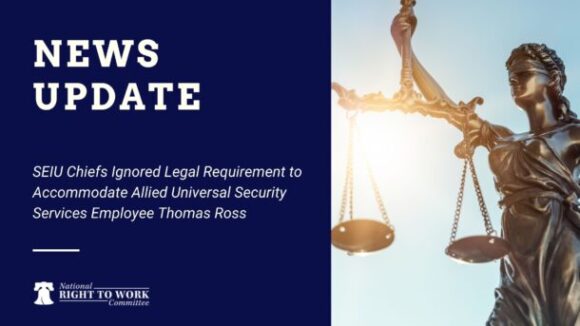
SEIU Chiefs Ignored Legal Requirement to Accommodate Allied Universal Security Services Employee Thomas Ross
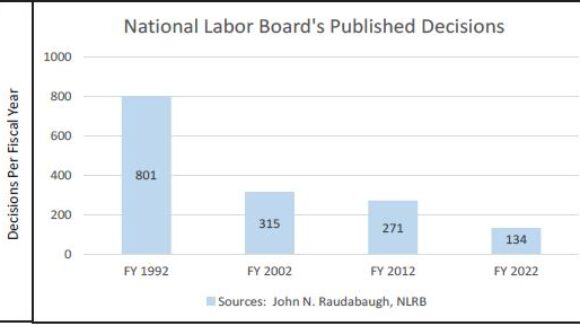
With the NLRB workload experiencing a long-term decline over the past 30 years, Biden appointees appear eager to expand their mission by criminalizing employer opposition to Big Labor “card checks.”
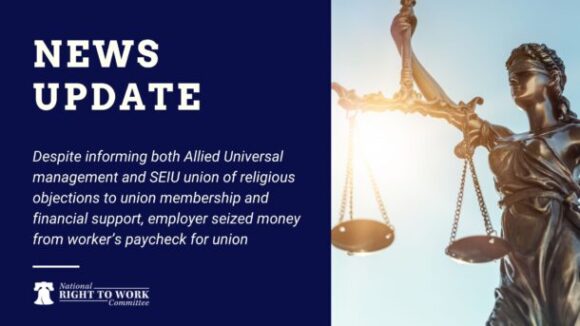
Despite informing both Allied Universal management and SEIU union of religious objections to union membership and financial support, employer seized money from worker’s paycheck for union

225 members of the U.S. House of Representatives, including 69 from Right to Work states, voted for H.R.842, legislation that would cut the heart out of every state Right to Work statute and constitutional provision that is currently on the books.
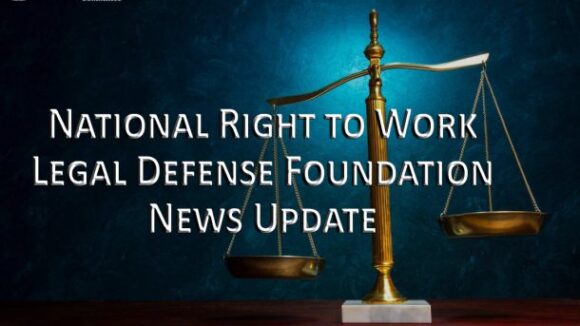
Two Transdev employees working at the Fairfax Connector are asking the NLRB to review their case, which seeks to remove OPEIU Local 2.

Go here to get the pdf version of the July 2014 National Right to Work Newsletter
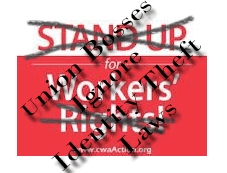
Washington Examiner, Mark Mix is president of National Right to Work OpEd:. One November day in 2007, 33 AT&T workers in central North Carolina found out that their Social Security numbers and other private information had been posted for the world to see -- exposing them to identity theft and credit fraud. [media-credit name="The National Right to Work Committee®" align="alignright" width="227"][/media-credit]There has never been any doubt about who posted the workers' private information, but the perpetrators have now escaped justice. All the employees whose names and personal information were posted had exercised their freedom under North Carolina's Right to Work law to resign from membership in a labor union -- the Communications Workers of America, or CWA -- and cease paying union dues. In retaliation, the union bosses of CWA Local 3602 proved that they know no bounds when it comes to making workers toe the union line. When these workers exercised their right to refrain from union affiliation, they were subjected to an extended union campaign of workplace harassment and intimidation. After the workers exercised their Right to Work, CWA union official Judy Brown emailed a spreadsheet that contained the employees' personal data (including their Social Security numbers) to other CWA officials with instructions to "forward this information to your affected locals." CWA Local 3602 union president John Glenn posted the spreadsheet on a public bulletin board. Other CWA union officials likely disseminated the information through email and other means.

Subscribe to The National Right to Work Committee® by Email Kudos Go to NLRB Members For 'Encouraging' Monopolistic Unionism The four current members of the powerful National Labor Relations Board (NLRB), all appointed or reappointed by President Barack Obama, are poised to make a series of major decisions expanding forced unionism over the next few months. Richard Trumka, president of the AFL-CIO union conglomerate, is licking his chops at this prospect -- and it's no mystery why he and other union kingpins are eager to see the Obama NLRB reinvent the federal rules for unionization campaigns. Chairman Wilma Liebman, an NLRB veteran first appointed to the agency in 1997 by then-President Bill Clinton and elevated to the leadership position by Mr. Obama in 2009, is an ex-Teamster union lawyer. And Obama appointees Craig Becker and Mark Pearce both come out of union legal ranks. More important, Ms. Liebman, Mr. Becker, and Mr. Pearce have all already demonstrated a willingness to go well beyond the pro-forced unionism letter of federal labor law to make it as difficult as they can for independent employees and businesses to avoid union monopoly control. Federal Labor Law Itself Tramples Freedom of Independent-Minded Workers Only one current NLRB member, former GOP Senate staffer Brian Hayes, has shown any real reluctance to rewrite the provisions of the National Labor Relations Act (NLRA) whenever they turn out to be inconvenient for union organizers. But Mr. Hayes is evidently destined to be perpetually outvoted by the three forced-unionism zealots who now sit with him on the Board. (The fifth NLRB seat remains vacant as this month's Right to Work Newsletter goes to press.)

Union-Label Academics Inadvertently Scrub Excuse For Forced Dues Union bosses like AFL-CIO czar Richard Trumka and Service Employees International Union czarina Mary Kay Henry have long cited a bogus rationale for forced union dues. Now even Big Labor admits it's phony. (Source: July 2010 NRTWC Newsletter) Under both federal and state law, union officials have always had the option to negotiate "members-only" contracts with employers that do not affect the terms of employment of workers who do not wish to join or pay dues to a union. But from the early 1960's until recently, Big Labor rarely if ever tried to exercise its members-only option. Current Law Authorizes Monopolistic Unionism Instead, union organizers have focused their efforts on imposing monopoly bargaining on all the employees in a so-called "bargaining unit." (The National Labor Relations Board, or NLRB, vaguely defines a "bargaining unit" as "a group of two or more employees who share a 'community of interest' and may reasonably be grouped together for collective bargaining purposes.") Monopoly bargaining in the private sector is authorized and promoted by both the National Labor Relations Act (NLRA) and the Railway Labor Act (RLA), and in the public sector by numerous state laws. Under monopoly bargaining, employees lose the individual right to bargain for themselves